The Power of Words
Words are powerful. Consider, for instance, the fact that right now you are staring at a grid of pixels on a computer screen and somehow because of this you hear a voice — my writer’s voice — inside your head. What more, through this voice you hear words that, as if by magic, conjure images, evoke emotions, or transport you across time and space. By a careful choice of words I can gain a certain degree of control over your mind, and consequently your behavior.
Because of their power, words must be used with care. To abuse words is to endanger people. This fact, though true in general, is most acutely felt in the case of scientific terms.
Take, for instance, the word ‘chemical’. Does it describe something dangerous or beneficial? Something to be avoided, perhaps? More than a few TV commercials boast the absence of chemicals in a product, and our supermarkets are filled with merchandise claiming to be “chemical-free.” What do these commercials and product labels mean, if they mean anything at all?
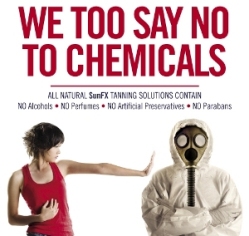
Sometime ago, after performing a science demonstration for a general audience, I was approached by a girl of about 6 years who called my attention by tugging at the bottom of my lab coat and calling me, “Mr. Scientist.” When I finally looked down at the little girl’s quizzical face, she said, “Mr. scientist, Mr. scientist, what is a chemical?” The question gave me pause. I had to put down the tray of glassware I was holding (which contained several chemicals) and sat down. I couldn’t have given her wonderfully deep question justice by merely blurting out a textbook definition. Neither would she have been satisfied with the meaningless answer, “Oh, everything is made of chemicals.” Light and sound aren’t composed of atoms, are they chemicals too? Are space and time chemicals? Is dark matter composed of chemicals? Her question deserved nothing less than a story in reply.
The word ‘chemical’, like many scientific terms, is a shorthand for a story of discovery. Every time we refer to something as being a chemical, or of a research as part of chemistry, we are referring to this story — we are making reference to a narrative. Like all stories of discovery, it is a rich and intriguing detective story where the mystery to be solved is nature’s behavior and where the detectives are the scientists. In telling this story, we also learn about related and likewise oft-used words like ‘organic’ and ‘natural’, words that, like ‘chemical’, are often used to appeal to people’s emotions but not to their reason.
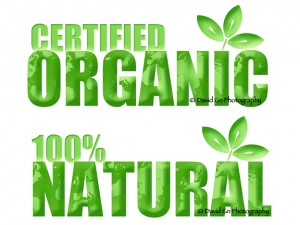
The (Distilled) Story of Chemistry
The story started with people asking what everything is made of. Are all the various things around us made of different stuff, or are they all made of the same stuff arranged differently? How many different kinds of basic stuff are there?
When this story began people let their imaginations run wild. “Everything’s made of water,” asserted Thales. “Nope, it’s all fire,” replied Heraclitus. “Atoms and the void, is what I say,” retorted Democritus. “My money’s on earth, air, fire, and water,” declared Aristotle. “Oh, and also ether,” he added. Most of these early thinkers scarcely bothered to check if their guess was the correct one.
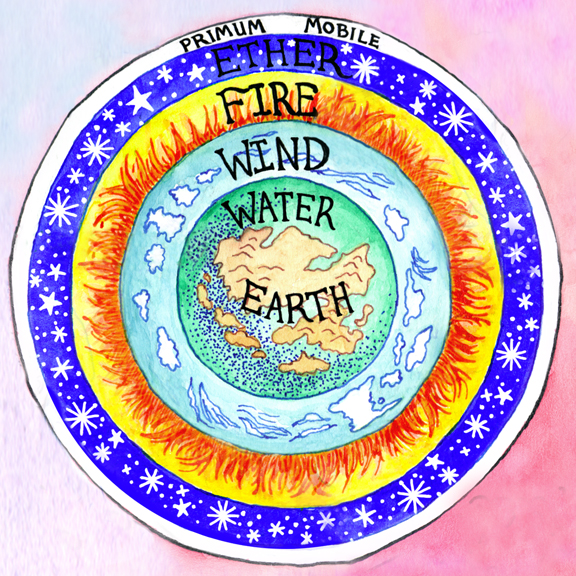
Sometime later, however, people started to earnestly and systematically burn, boil, pulverize, and purify every piece of ore they could get their hands on. In the hopes of one day finding a way to change common metals to gold or extract the elixir of life, these investigators carefully wrote down their methods and observations, trying to find patterns behind it all. In detective stories, this is the part when the detectives pin the many collected clues onto a board, connect related clues via strings, and stare at the constellation of facts wishing to discover the secret symmetry behind it all. These mortar-and-pestle-wielding detectives were called alchemists, a word which can be traced to the Greek word ‘khemia’ or the”art of transmuting metals”. Little by little the alchemists, who were later succeeded by people who called themselves ‘chemists’, saw a pattern emerging, a pattern suggesting that while most things are made of a mixture of stuff, some are made of just one kind in pure form. They called the latter group ‘elements’. The rules that govern the interactions of the elements came to be known as chemistry, and the products of these elements mixing and matching came to be called chemicals. (And oh, they also finally got the hint that you can’t turn lead into gold through chemical means, but by that time they found use for their knowledge in distilling good whiskey, and that more than made up for it.) After some false leads involving non-existent substances like “phlogiston”, the chemists eventually came up with the Table of Elements tabulating all the basic stuff that make up tables, chairs, planets, and stars.
The Essence of the Organic
But what about plants and people? What about animals and those unseen things called “germs” that make folks sick? Clearly they must be made of different stuff, aren’t they? After all, trees grow, fruits rot, animals make other animals, and things that live eventually cease to be alive. Dead matter like mineral ores, alkaline solutions, and hazy vapors did none of these things. Because of the striking difference between rock and rabbit, early detectives thought that living organisms were made of some special, life-giving stuff — organic matter, they called it (from the Greek ‘organikos’, meaning “relating to an organ or instrument”). And because the ‘vital force’ that moves a cheetah during a chase seems so different from the mundane forces of the elements that move pebbles around,investigators thought the processes of life were fundamentally different from those undergone by lifeless chemicals. (The word vital comes from the Latin ‘vita’, meaning life.) If you look at the miracle of life with eyes unaided by our current knowledge, as when you compare a rose in bloom with a crystal of rose quartz, it’s easy to relate with this mistake in understanding. But given how our modern life depends on the most recent scientific insights, it is important that we progress from this mistake.
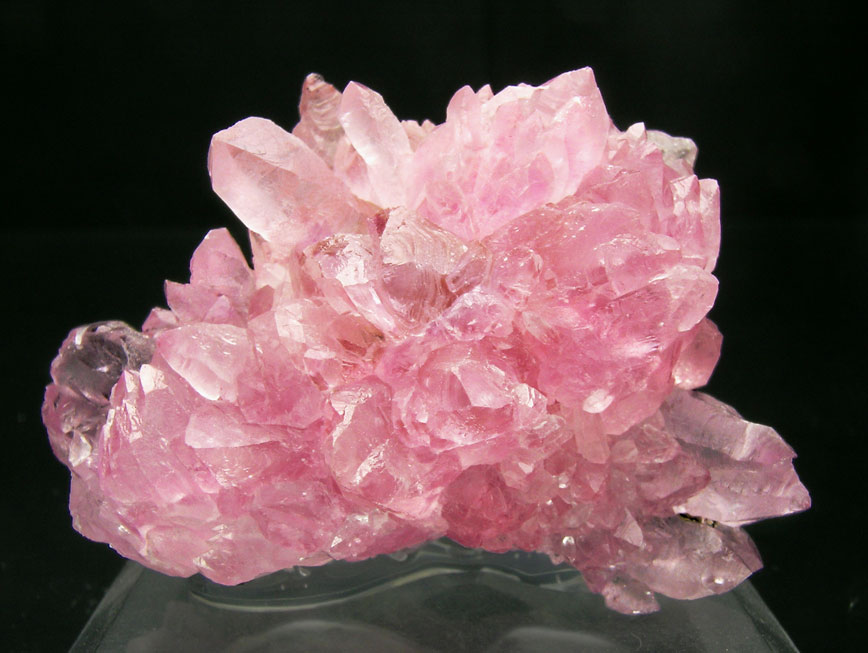
What we would call living matter, it is now known, is made of stuff that can be found in the Table of Elements. Recall that these elements were discovered by people who dealt with so-called dead matter. For example carbon, which there’s a lot of in living things, is also what makes up diamonds, and the oxygen that so confused many chemists into thinking about phlogiston is just the pure form of the oxygen found in sugars and many other so-called organic molecules. What more, the rules that govern the interactions of the elements in flasks and test tubes are the same rules that hold inside cells and working organs — life is just chemistry. However, despite the fundamental similarity between dead matter and living matter, the differences are striking and important. The chemistry of life is mesmerizing; it’s complex and delicate — one might say that life is chemistry on acid. All this is made possible by the chemical properties of the element carbon, an element which can form the backbone of compounds as simple as ethanol and as complex as DNA. For this reason, we stuck with the original terminology ‘organic’. But because we know better, we now call the study of organic substances ‘organic chemistry’.
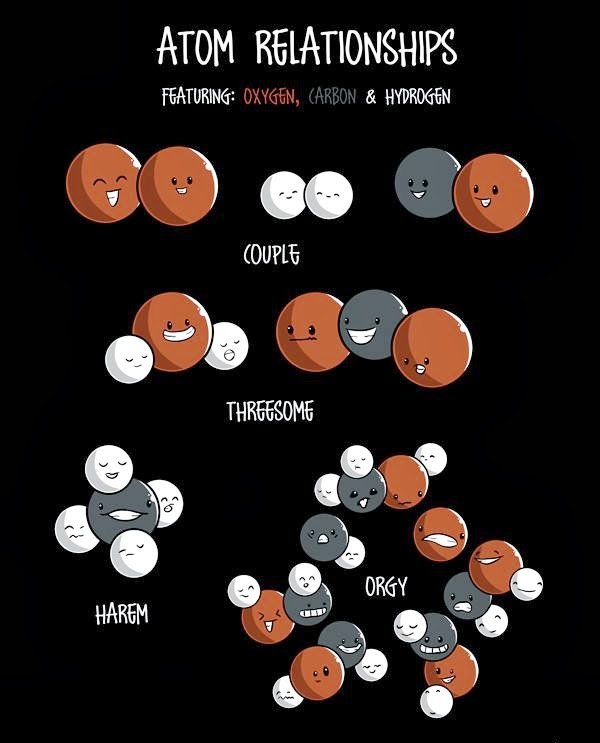
Organic substances are chemicals. The food we eat, the drugs we take, and we ourselves are composed of these chemicals. The processes that move our muscles and power our thoughts are chemical processes. It is therefore absurd to avoid chemicals and dishonest to claim that a pharmaceutical product, a product that has benefited from great advances in chemistry, contains “no chemicals”.
We continue to use the words organic and inorganic out of convenience because they signify concepts that are helpful in organizing our world. But a lot of important properties easily cross this divide of convenience. For example, many organic substances are poisonous or toxic, and a lot of inorganic ones, like water and table salt, are needed by living things.
In agriculture, the word organic is often used to describe a certain group of food and farming methods that involve audit trails to ensure that certain standards are met in animal welfare, agricultural drug use, the application of biotechnology, corporate transparency (or more often the lack thereof), ecological impact, and many more. The problem with this use of the word organic is that it has little to do with the scientific meaning of the term. More often than not, people use the word ‘organic’ to invoke emotion without invoking much thought. True, some chemicals used in industrial farming might be harmful to the environment and the health of consumers, and it is best if we replace them with chemicals that work just as well and that have fewer negative side effects, but their being chemically organic or inorganic has little to do with it. The same can be said about their being natural or unnatural.
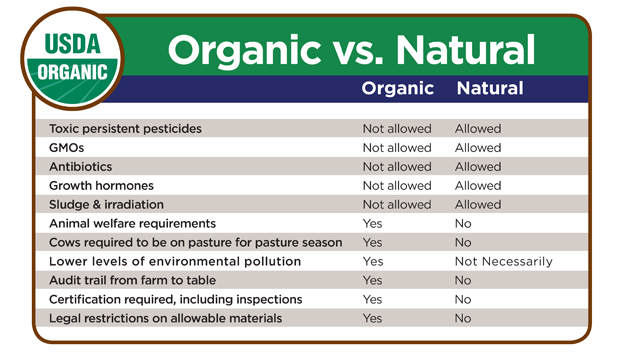
Natural Tendencies
When I’m in the supermarket, I am always amused to see so many products claiming to be “all natural” while being wrapped or contained in plastic and placed on a refrigerator in an air-conditioned, artificially-lit department store. But what about that seedless banana that looks so different from its wild counterpart? Does growing this product of generations of human cultivation without using pesticides and fertilizers make it “all natural”?
The word ‘natural’ is tricky because it means a handful of very different things. The word can be traced to the Latin ‘natura’, meaning birth in the sense of “having a certain status by birth”. It is natural, for example, for most people to want to eat. It is a tendency that people have since they were born. It is not natural, however, to want to listen to obscure music. Babies don’t have an inclination to visit pitchfork.com. Things like taste in music are what we describe as ‘cultural’, a word that can be traced to the Latin ‘cultura’, meaning ’tillage’. Something cultural is something that is cultivated. (Does this mean that anything cultivated, like nearly all plant products we currently consume, are not natural? In this sense, yes.)
The word ‘natural’, however, was for hundreds of years also used to refer to the collective phenomenon of the physical world outside the realm of human control. On the one hand was nature with its trees, animals, mountains, clouds, and rain, and on the other were humans with their cities, governments, philosophies, culture, and Stanley Kubrick films. A line was drawn between what was natural and what was ‘artificial’ (from the Latin ‘artificium’ meaning handicraft). Using this sense of the word ‘natural’, the predecessors of scientists called themselves ‘natural philosophers’ — people who love to reason about things that happen outside the human sphere.
The more these natural philosophers learned about nature, however, the more they noticed that the dichotomy between the natural world and the human world is at best arbitrary and at worst untenable. Not only are we made of the same stuff that make up things that were considered natural, we are governed by the very same “laws of nature”. Humans are part of nature, there is no way out of it. (After all, what is outside nature? That is, what is supernatural? Jensen Ackles’s handsomeness, maybe?)
As with the case of the word ‘organic’, we continue to use the words ‘nature’ and ‘natural’ because they are convenient shorthands. When we say a chemical “exists in nature”, we mean that it would exist even without humans manufacturing it. When we say a phenomenon is natural, we mean that it would happen even without humans around making it happen. As with ‘organic’, the main problem with ‘natural’ is not its uselessness, but the emotional undertones that people incorrectly attach to it. The word ‘natural’ is very often used as an assurance of superior quality. It is not. Parasites and pests are natural. Poisonous fruits and plant toxins are natural. Many diseases are natural. Heck, death is natural. Compare the above natural things with the following, all of which are artificial: lifespans that are relatively long and comfortable, low infant mortality rate, homes made cozy by electricity, medicine, anesthesia, distilled water, contact lenses, pet animals, YouTube, and Lena Headey’s blond hair in Game of Thrones. While one can argue that at least one of these is not good, the rest are great. Who can imagine life without modern medicine? Or YouTube?
Science and Stories
‘Natural’ does not mean better nor ‘artificial’ worse. ‘Organic’ does not mean beneficial nor ‘chemical’ harmful. These words have rich and complex histories, and we do these histories a great injustice by using the words that stand for them simplistically. Worse, by forgetting the stories behind these words, we not only forget all the amazing men and women who have labored to discover the workings of the world, we endanger ourselves by failing to grasp the nuances of their meaning.
Needless to say I did not tell all of these things to the little girl who asked me about chemicals. I told her a story that was more brief and less pretentious than the one above. She seemed to enjoyed it. At the end of the story, the little girl asked me one last question. She said, “So scientists are story tellers too?” “Yes,” I said, “Scientists are story tellers. But most of all, they are story makers.”


I like this article. A lot of people including my family likes to say “those products have chemicals in them so you shouldnt buy them”. It takes a lot of effort to resist cringing.
No to chemicals! Especially Dihydrogen Monoxide, the leading cause of drowning in the world!
http://www.dhmo.org/facts.html
I approve this post.